'The tank battle was fought at ranges of 300-700 metres.'
'It was a rare example of the complete destruction of a squadron by another squadron.'
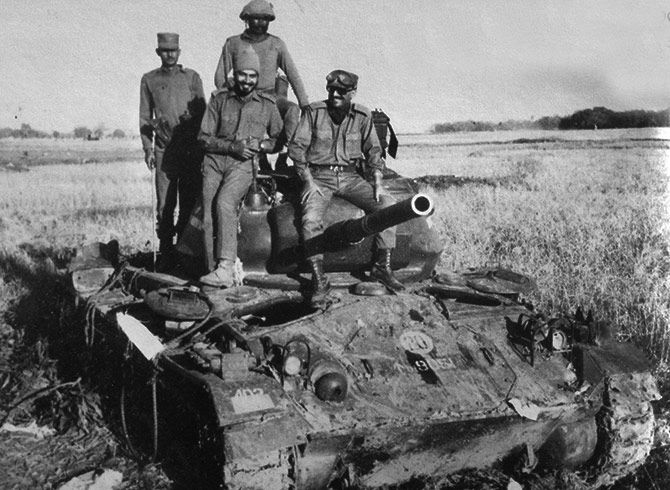
"Watch Pippa along with your friends and family. It will give you goosebumps," says War Hero Brigadier Balram Singh Mehta, the central character of the film that has released on Amazon Prime Video today, November 10.
Just 26 and five years into the Indian Army in 1971, the young captain took over command of the Russian made PT-76 tank squadron of 45 Cavalry after his commanding officer Major Daljit Singh Narang was killed on the battlefield.
In a ferocious tank versus tank battle across the border in East Pakistan, the brave men of 45 Cavalry led the Indian advance and destroyed all the 14 tanks of the Pakistani squadron.
At the end of the battle, the enemy tanks were burning in front of their eyes.
The captain promised his troops that he would write a book documenting their glorious victory in the Battle of Garibpur fought on November 20-21, 1971.
The Burning Chaffees [the American made M24 Chhaffee tanks belonging to the Pakistan army] was finally published 50 years later on the unit's golden jubilee.
The book forms the basis of Pippa.
The tank was called 'Pippa' or 'Peepa', the Indian word for a tin can after a Punjabi soldier exclaimed that it resembled a bobbing can of ghee in the water.
The word stuck in military usage for the Soviet-origin light weight tank that could wade in water.
"What we accomplished on the battlefield was a rare accomplishment in Indian military history," says Brigadier Mehta who belongs to an illustrious military family.
His father was commended for bravery in the Afghan war and joined the Indian AccountS and Audit Service after moving to India from Rawalpindi post-Partition.
He died in 1953 with the wish that his sons should join the Indian Army and one by one, all his four went on to fulfil their father's desire.
Brigadier Mehta took early retirement and now lives in Dharamsala, Himachal Pradesh. In a conversation with Rediff.com's Archana Masih, he gave a soldier's account of the great victory and the final salute to their commanding officer on the battlefield.
'We fought the Pakistanis -- tank vs tank -- in thick winter fog'
There was a thick blanket of fog which put us in a better position to receive the enemy on the night of November 20-21, 1971 in the Battle of Garibpur in East Pakistan.
Everybody had to take turns during the night to remain on watch.
I was a captain and second in command of my unit. I was part of the tank crew which consisted of four people. It was my responsibility to coordinate and redeploy the tanks so that we could retaliate under attack.
The battle started early in the morning at about 4:30 am.
The infantry battalion of 14 Punjab was supported by a squadron of 14 Russian-made PT-76 tanks of the 45 Cavalry.

'We paid a 21-pistol volley as a final salute to our commanding officer killed on the battlefield'
My squadron commander under whom I was serving was killed in action.
Just as I received this message, I realised that my own tank gun was not working. It took about a minute to set it right which gave some breathing time.
I took a pause and then communicated to the rest of the squadron on radio that I was taking over command.
The enemy fire was in progress. By the end of the battle, we had destroyed all the 14 enemy tanks.
We pulled out the body of our commanding officer Major Daljit Singh Narang from the burning tank. We paid a rare and exceptional tribute to our fallen commander.
We lined up the tanks and fired a 21 pistol volley in a final salute. There is no recorded history of such a tribute in the annals of military history.
[Major D S Narang was awarded the Mahavir Chakra posthumously.]
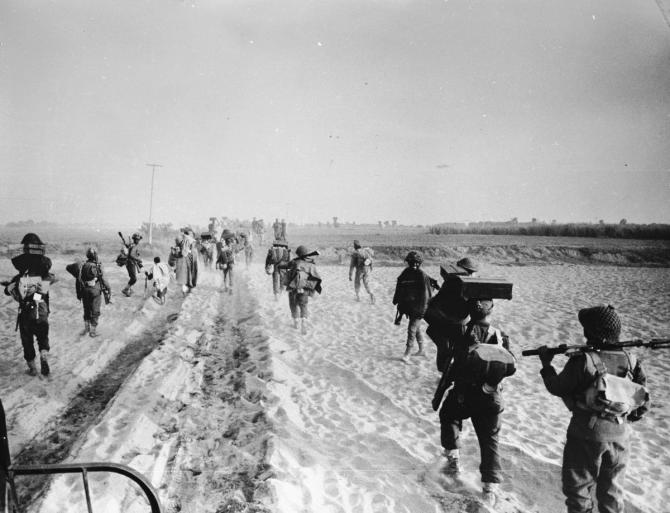
'The CO's death was a shock, but we revived the attack'
My own tank and gun was immobilised. My squadron commander lay dead, and the entire radio network had fallen into silence.
It was a shock, not only for me, but for all the tank crews who were in the battle because they were listening to the radio communication that their commander had been killed.
They did not know what to do. Each one reacted based on his own knowledge and individual character. They thought will the second in command take over? Will there be a panic? What exactly will happen to the battle?
Within 30-45 seconds, the message went out that I was taking over command, which virtually revived the tank crews.
We started firing our tanks again. In the tank vs tank battle we started destroying the enemy once again.
'The enemy tanks were burning in front of us'
In the evening, I called all the tank commanders and crew for another coordinating conference to prepare for the next day's ground attack which was going to be supported by an air attack.
In front of me lay a large number American-made M-24 Chaffee tanks of the Pakistan Army.
The enemy tanks were burning in front of us.
The tank battle was fought at ranges of 300-700 metres. It was a rare example of the complete destruction of a squadron by another squadron.
I thanked the tank crews for their action on the battlefield. There was word of praise for everybody.
'I had made a promise on the battlefield'
For me personally, it was an experience where one had seen the face of death.
Once you've seen death, life becomes that much more enjoyable because you can separate the value and meaning of life from the purpose of life.
That is what makes a difference.
My tank crews told me that they wanted me to publish the record of their bravery and sacrifice. It was a promise made on the battlefield and honoured 50 year later when the unit celebrated its golden jubilee.

'The battle sent alarm bells around the world'
It was such a significant achievement that two days later, Prime Minister Indira Gandhi mentioned in Parliament that the Indian Army had destroyed a 14 Chaffee tanks and three F-86 Sabre jets of Pakistan.
This sent alarm bells across the world. In fact, the very same morning, Henry Kissinger was telling then US President Richard Nixon that the Indians had destroyed Pakistani tanks and aircraft in the attack.
This also sent a message to the world that we will no longer succumb to international pressure. We will step into war if necessary to ensure the liberation of East Pakistan so the 10 million refugees in India could return to home and hearth.
'It was a glorious victory'
It was a glorious victory because such an action across the border was happening for the first time.
It was a tank versus tank battle in which 14 enemy tanks were destroyed by 14 Indian tanks with the loss of only two tanks.
It was a rare accomplishment in Indian military history, and there is hardly any similar example in the world combat history as well.
This particular tank squadron had great impact on the Pakistani generals. It left them with no choice but to declare war by December 3, 1971.
We had already crossed the border and were in contact with the enemy. War was declared on December 3 and we carried on for the next 25 days.
I lead the tank troops and the division all the way to Khulna and accepted the surrender on 16 December.
The Chief of Army Staff General Sam Manekshaw sent a congratulatory note and made sure that the unit got a large number of awards.
We got about 40 gallantry awards.

'The film captures the battle very well'
Ishan Khatter and the cast have done a good job. The story gives goose bumps to all those who've heard or read about it.
The book Burning Chaffees was initially published by Knowledge World and will be published by Penguin.
It has been translated into Gujarati and Hindi. There are talks with the publisher to bring it out in Bengali and Marathi.
Feature Presentation: Aslam Hunani/Rediff.com

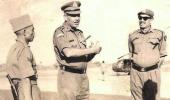







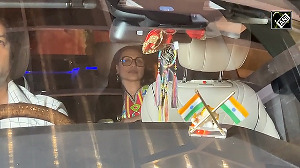
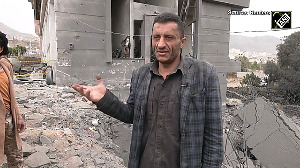
 © 2025
© 2025